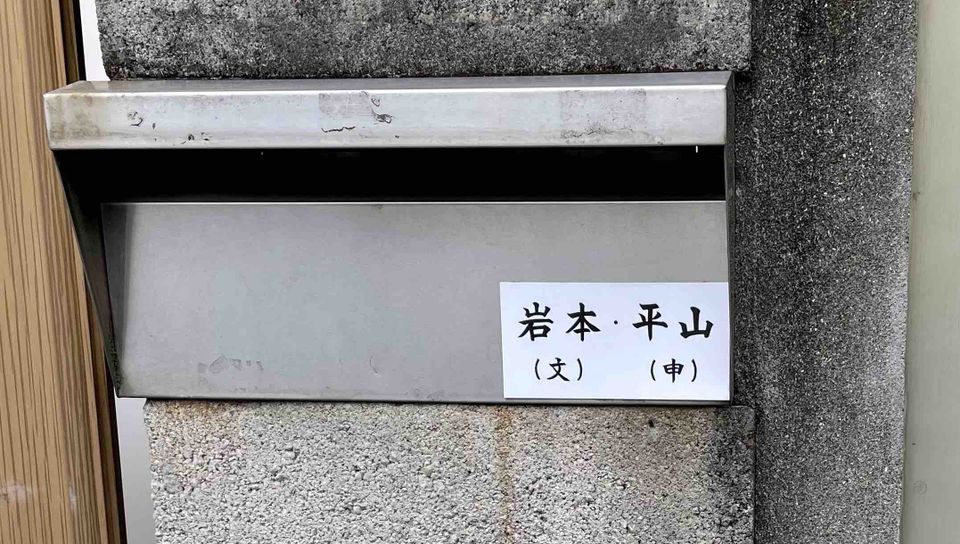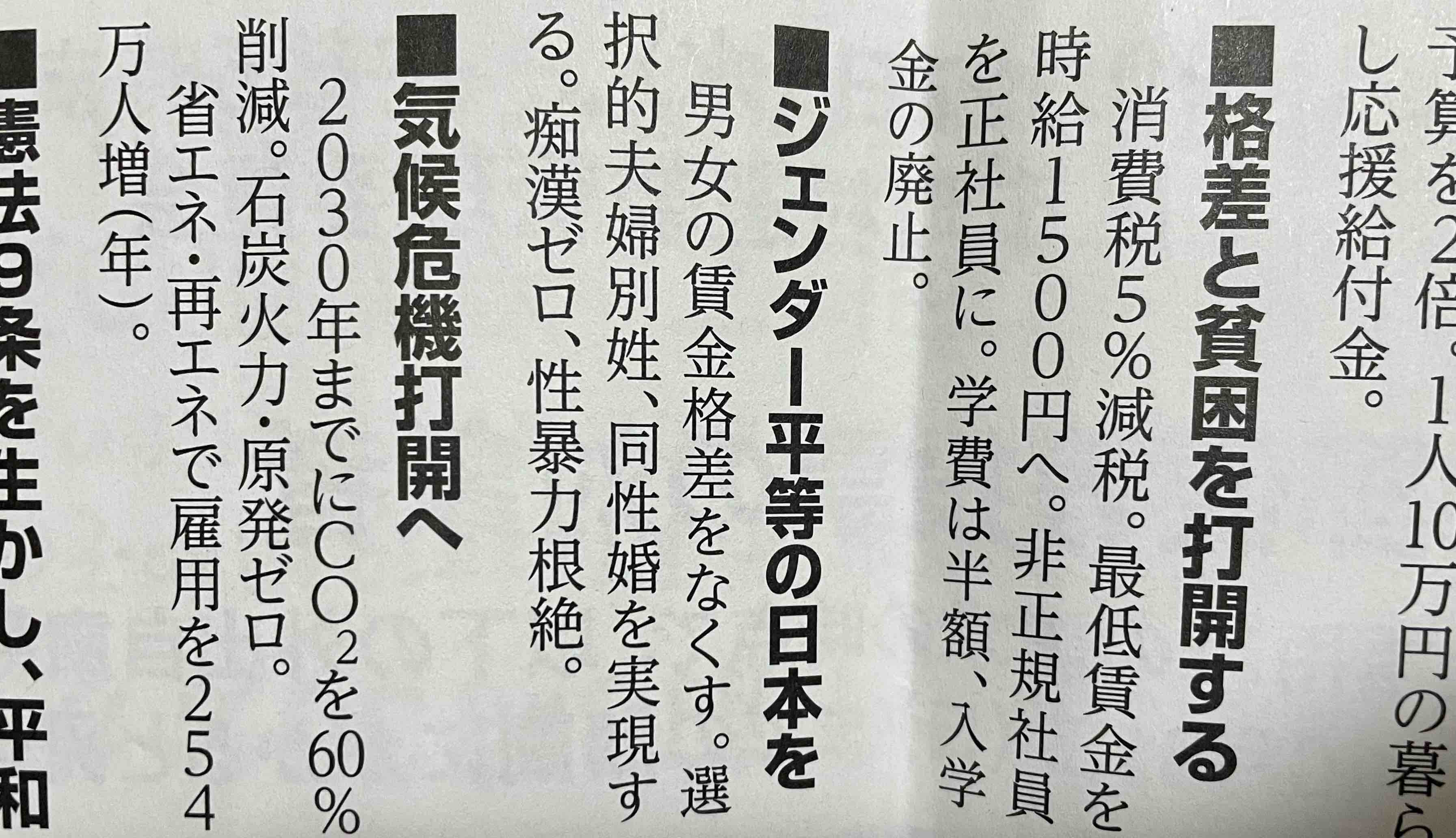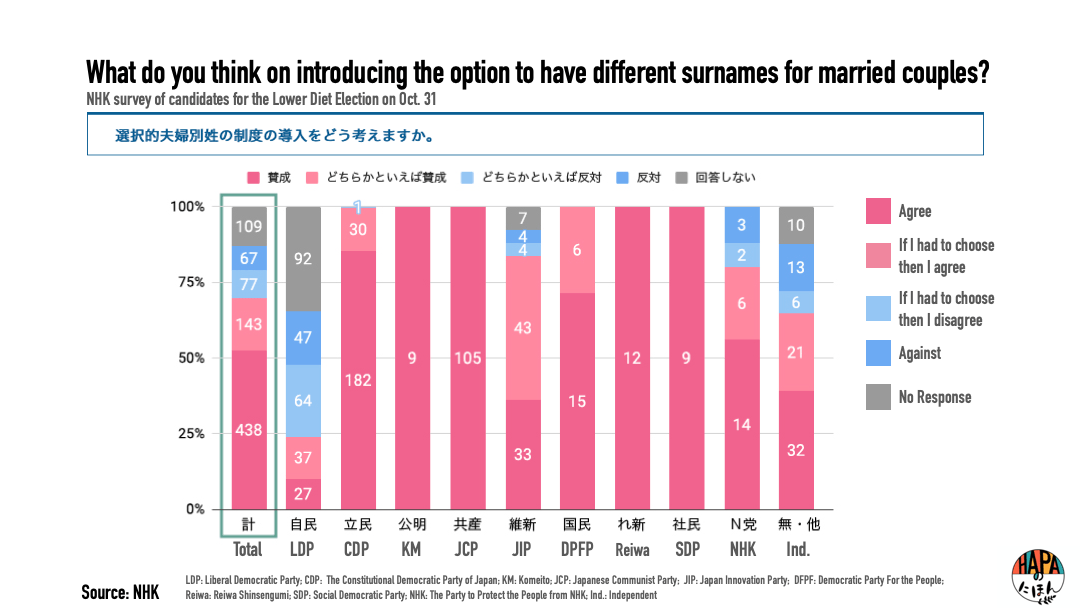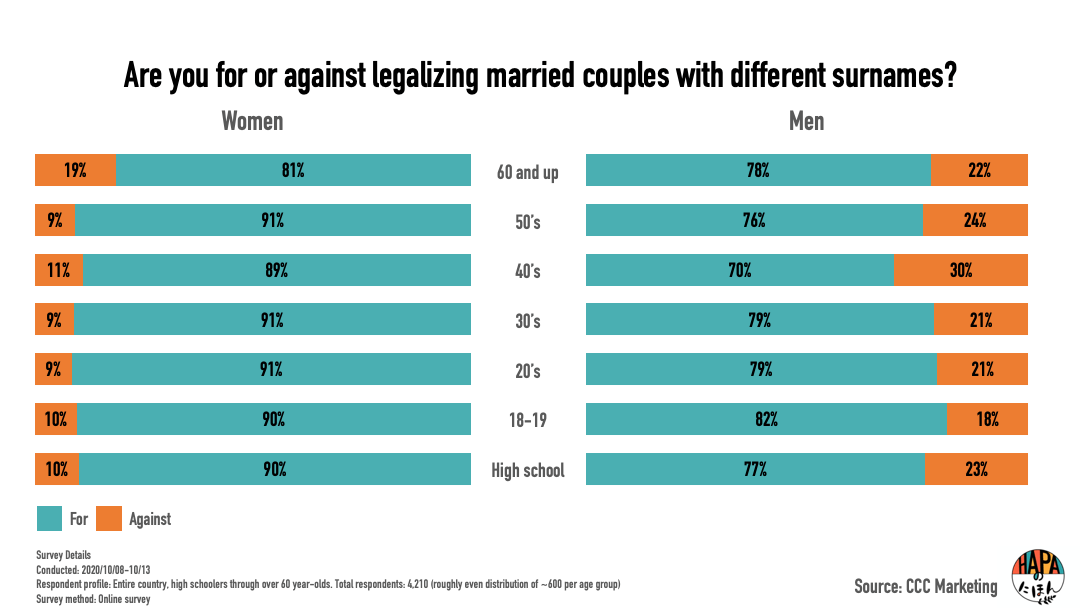A married couple with different last names? In Japan this is a controversial idea
In Japan, married couples must have the same last name. While the couple does have the option to choose the women’s last name, due to social expectations and tradition the husband’s is chosen 96% of the time

In Japan, married couples must have the same last name. While the couple does have the option to choose the women’s last name, due to social expectations and tradition the husband’s is chosen 96% of the time[^1]. This is a topic of discrimination against and inequality of woman, and has been a controversial topic for the country. Even the United Nations Committee for the Elimination of Discrimination has urged Japan on multiple occasions to change the system.
In a Japan this issue is known as fufubesei 夫婦別姓.
夫婦:Married couple
別: Different
姓: Surname
Background on the law
The provision originates from 1898 Civil Code. Article 750 stipulates "a husband and wife shall adopt the surname of the husband or wife in accordance with that which is decided at the time of marriage." This is a more traditional view of marriage, with focus on the family.
This law has been challenged before at the supreme court level. Most recently in 2021 and six years before in 2015. The overall decision did not change much. In the court ruling this time around, four of fifteen justices stated that prohibiting separate surnames was unconstitutional, compared with five in 2015. In addition, the courts announced that this is a decision that should be decided among the Diet (Japan’s legislature), not the courts.
What are the counter arguments for different surnames?
The main counter argument against different surnames is the concern for family unity and impact on children. While it does complicate paper work, it is difficult to find hard evidence* for negative impact on families.
If you are aware of studies that do prove this wrong, please contact me.
How is this playing out in recent politics
 Political ad promoting *fufubesei*
Political ad promoting *fufubesei* This was one of the hot topics for the general election of the lower house of the Diet (House of Representatives) on October 31st. The newly elected Prime Minister Kishida has taken no stance on the topic, insisting that it needs “extremely careful consideration” due to the family impact. His party, the Liberal Democratic Party (LDP), which is the controlling party, has historically been against the right to have separate surnames.
Other competing (minority) parties, such as the Constitutional Democratic Party and the Japanese Communist Party have taken stances for the right to keep separate surnames.
I was unable to find a survey of the stances of the politicians in power, but NHK did poll all of the candidates for the election on October 31st.

On a party basis, most are in favor. The trick is to look at the candidate count for each party. LDP has more candidates than other party, and you can easily see that many are either against or indifferent.
There are also concerns about politicizing the argument. This issue is often categorized under “gender”, which also encompasses gay marriage and abortion. While, the fundamental issue is the “right” to be able to do something, these issues are also of different categories. With political parties taking hard stances on this argument and other “gender” issues, people may be turned away.
“When politicians are against the issue it seems fluffy. It’s almost like they’re against it because their opposing political party is for the issue.” –Woman in 20’s
The election results are out and with LDP maintaining their majority party status, it seems unlikely things will change soon.
Implications for women and society
This issue also involves more than personal identity and having the freedom to decide. The impact stems further than just changing one’s name on paper.
Loss of Identity
For one, it is loss of one’s identity. For those women (and some men) who built their reputation and brand, especially with strong ties to their name, lose that when they are forced to change their name. In some professions of course this does not matter as much, (but some occupations such as politicians or musicians where it could be their brand.) German Chancellor Angela Merkel, US Vice President Kamela Harris, and New Zealand Prime Minister Jacinda Ardern are a few high profile politicians.
One of the couples who filed a lawsuit against the Japanese government was Film director Kazuhiro Soda and dancer Kiyoko Kashiwagi. They are based in the US and married under New York state law for 24 years, while keeping their respective names. However, when they applied for marriage in Japan, it was rejected due to this. For this couple, their home country did not recognize their marriage. (Asahi)
Moreover, in Japan, people go by their last names. I am sure many have heard XXX-san. For example, John Smith would go by Smith-san. When woman get married, it’s not just their last name that changes, but the name people call you by. On top of this, all of the official documents, like passports, banking information, etc. needs to be changed. Not only is this a hassle, but it is often a burden on the woman, with the husband unaware.
I heard a story from a woman who recently got a divorce. “I took a whole day off of work to change my name back” she said. While it is possible to do this on weekends, many governmental agencies are closed on the weekend or have limited hours, making it a challenge.
Economic and legal benefits
 A flower photo break
A flower photo breakWhile, yes, a couple could be unofficially married (not registered with the law), there are often legal and economic benefits that the couple would be missing out on. To name a few, there are tax benefits, rights to inheritance, and adult guardianship. In addition, in recent years due to the declining population and low birthrates, the government has begun several benefits and subsidiaries for couples. For instance, couples under 34 with a combined 3.4 million yen ($30,000) can receive 300,000 ($3,000) for moving, buying, or renting a home. Others include infertility treatment grants and child-care subsidiaries.
The disadvantage of not being legally married has grown with the COVID-19 pandemic. If a couple is not legally married and one of the partners becomes severely ill (for example with corona virus), the partner cannot agree to the “medical agreement” documentation to decide the treatment as these documents are limited to legal family members. For those in these situations, the partner is unable to make crucial decisions for their loved one.
Holding Japan back in gender equality
Due to the social pressure of society, the name change is almost always the husbands, which makes this an issue of gender inequality.
Linda White, a professor in Japanese Studies at Middlebury College and author of “Gender and the Koseki In Contemporary Japan: Surname, Power, and Privilege”, explains how the koseki system (family registry) has contributed to the patriarchal control of society in Japan.
As highlighted before, Japan severely lags behind in female reputation in national parliaments. Furthermore, women held only 7.8% of managerial positions in 2020 (Teikoku Bank). The list of other statistics and figures goes on and on. The bottom line? Japan is far from gender equality.
What do people think?
Surveys of the public
In recent poles, a majority of respondents say they are for the option for married couples to have different names. Women usually have higher percentage for support than men, and younger generations as well. Below is one of the many polls I found that seemed to be fairly in line with results from other surveys.

Unsurprisingly, women are more likely to be in favor than men with a trend for the younger generations to be more accepting. The gap between men and women seems to be evidence for the desire of men to keep control of their patriarchic society. An area of interest, is why the 40s males are the highest segment against different surnames.
“The thing is, many people are not against the issue. If this were to become legal, I don’t think it would change society on a large scale. I don’t think many people would actually have different names, and different surnames doesn’t really effect other people.” – Woman in 20s
An interview with a couple
I spoke with a couple who got married in their 40s. They have no children and chose to take the husband’s name. I asked them separately what they thought about the issue. This is what they said.
Wife (50s) who changed name to Husband's:
“Japan is a country where people are called by their last name. So it feels uncomfortable to have your name changed just because of marriage. Under the current Liberal Democratic Party administration, I don’t think this would become legalized. The number of politicians with old-fashioned and outdated opinions is far too great.”
Husband:
“I am for the right to have different surnames for married couples. In particular, I think it’s tied to discrimination against women. In the case that it actually is discrimination, then it is a must. However, I think it is important to address the following:
*- The problem of family unity
- Will it become easier to divorce?
- What to do with the child’s last name?*
The unity of family and low divorce rates are very important. If families (and people) are happy then it is linked to world peace. There are some people who say that high divorce rates are not a problem, but this is a relative and separate argument.”
What do you think?
Politics can get hot and messy, but I would love to hear your thoughts on the topic. Is this surprising? What do you think will happen? What would you do if you were in Japan? I am working on comments, so feel free to go visit the article on the site here, or send me a message here. (for those who use the contact form, please do not forget to put in a reply email if you would like a response from me.)
[Full disclosure, the quotes in this article are from people that I am friends with, and consequently there is selection bias. Please keep in mind, this is not necessarily representative of the entire population.]

